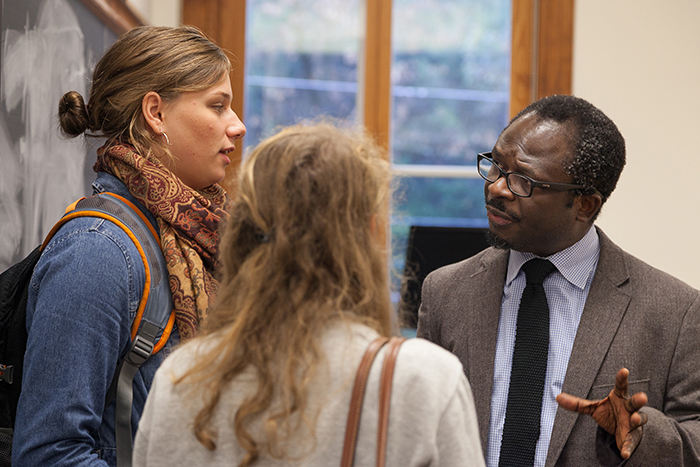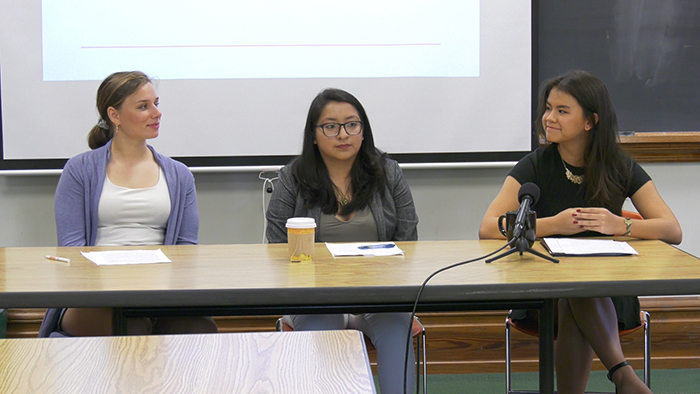#ChangingTheWorld

Jacob Jacob, visiting international scholar in international studies (far right), in an after-class discussion with students in his Social Movements class. Photo by Carl Socolow '77.
Students roll out social-media campaigns designed to spark meaningful change
by MaryAlice Bitts-Jackson
If you have internet access, you have the power to connect in ways unimaginable to previous generations. But do you know how to effectively harness that technology for the greater good? A new class—combining theory, history and practical grassroots experience—shows the way.
The class, Social Movements, Social Media and Global Change, introduces the theories and practices behind social-media-fueled movements like “BlackLivesMatter and #BringBackOurGirls and challenges students to plan and execute a digitally fueled social movement around a cause. Seventeen students are taking the class this fall, and they’ve divided up into three groups, each devoted to a single social-justice issue. Their campaigns are now underway.
REFRAMING REFUGEES
One student group, The Refugee Show and Tell Project, hopes to shape national and international conversations about refugees—and, in so doing, eventually influence related policies—by reframing the public's understanding of just who refugees are.
"Ultimately, this campaign is about empathy and responsibility," says Andrea Bisbjerg ’18 (international studies, French & Francophone studies), who notes that sensationalized news coverage of the global refugee crisis can prevent people from seeing refugees as multidimensional and relatable individuals. “We’re giving [refugees] agency and voice so they can shape the narrative."
This team will interview refugees and post videos of those interviews on a dedicated website, along with information about the refugee crisis and writings, artwork and music created by refugees and posted with their permission. The students plan to make their online exhibition downloadable so users around the world can show these videos and works in their own communities. The group also plans a "day of action" and hopes to partner with nonprofits and campus groups to facilitate refugee talks at local schools.
MAKING AMERICA DREAM AGAIN
Another student group, DACA Defenders, concentrates on the Deferred Action for Childhood Arrivals (DACA) program, an Obama-era initiative that protected unauthorized immigrants who came to the U.S. as children from deportation and allowed them to work legally on American soil. The Trump administration is winding down the program, and the "Dreamers" who registered for DACA protections are slated to lose their work permits on March 6. The team aims to inspire citizens to pressure Congress to pass a bill protecting “Dreamers” before that official end date.
“This is a moral [issue], and ultimately, it’s about human decency. These dreamers have done nothing wrong,” says Kimberly Lopez Castellanos, a visiting student from a Dickinson EcoLeague partner university, College of the Atlantic.
Through an informational website and hashtagged Facebook, Twitter and Instagram posts on joint and personal accounts, these students hope to educate the public about DACA and tell stories illustrating immigrant contributions. They also will hold a rally to ramp up enthusiasm for the cause; an online sale of “Make America Dream Again” hats will fund the campaign.
REFORMING UNFAIR LABOR PRACTICES
The third student group will use the hashtags #StopPrisonLabor and #BreakingBars, along with dedicated Facebook and Instagram accounts, to promote change within the U.S. prison system. They hope that, by providing information to the public about the issue and about how to contact their representatives to demand action, they will help put an end to current prison-labor practices in the U.S.
“No one deserves to be treated the way that prisoners are treated,” says Mary Smith ’20 (undeclared), who learned about prisoner pay rates during a philosophy class centering on the history of civil rights movements, which included a discussion on the Netflix documentary 13th.
This team's website will include statistics relating to the cause, a list of organizations that benefit from prison labor and personal stories of inmate experiences. The students will post on social media regularly to drive to the site. They will partner with students who volunteer at the local prison and with related nonprofits to collect inmate stories and host events on campus, including a Q&A and screening of 13th.

Students announce the rollout of their social-justice campaigns. From left: Mary Smith '20, Kimberly Lopez Castellanos and Andrea Bisbjerg '18.
ASSESSING THEIR WORK
All three teams will measure their campaigns' effectiveness by tracking social media engagement—shares, likes, downloads—throughout the semester. At the end of the course, the students will present their final analyses publicly before a panel of five experts, who will judge their work.
Jacob Udo-Udo Jacob, a visiting international scholar who teaches the class, notes that while the students gain practical experience in social media marketing, grassroots organizing, networking and team project development and analysis, they also enjoy the satisfaction of working together to benefit a cause they believe in—and adds that this experience can have far-reaching effects. “It gives them a sense of citizenship,” explains Jacob, the author of Convincing Rebel Fighters to Disarm: UN Information Operations in the Democratic Republic of Congo (Degruyter, 2017) who earned his Ph.D. in communication studies from University of Leeds (U.K.), and taught a similar course at American University of Nigeria as a colleague of President Margee Ensign, “and it inspires them to be socially engaged members of society.”
In the meantime, student-activists like Smith say they are eager to make a measurable mark.
“Standing up for rights is never easy, but we cannot stand by [in the face of injustice],” she says. “We intend to get this message to the highest levels of our government.”
Read about Jacob's leadership in student-led civic-engagement projects in this interview highlighting his recent work in Nigeria.
TAKE THE NEXT STEPS
Published October 13, 2017